formerly eScholarship Editions


|
|
|
|
Your search for
'Russian and Eastern European Studies' in subject
found 43 book(s). | Modify Search | Displaying 1 - 20 of 43 book(s) | |
| 1. | 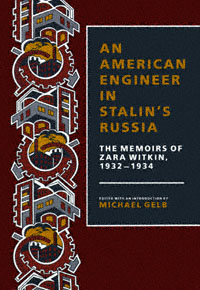 | Title: An American engineer in Stalin's Russia: the memoirs of Zara Witkin, 1932-1934 Author: Witkin, Zara 1900-1940 Published: University of California Press, 1991 Subjects: History | European History | Autobiography | Russian and Eastern European Studies Publisher's Description: In 1932 Zara Witkin, a prominent American engineer, set off for the Soviet Union with two goals: to help build a society more just and rational than the bankrupt capitalist system at home, and to seek out the beautiful film star Emma Tsesarskaia.His memoirs offer a detailed view of Stalin's bureaucracy - entrenched planners who snubbed new methods; construction bosses whose cover-ups led to terrible disasters; engineers who plagiarized Witkin's work; workers whose pride was defeated. Punctuating this document is the tale of Witkin's passion for Tsesarskaia and the record of his friendships with journalist Eugene Lyons, planner Ernst May, and others.Witkin felt beaten in the end by the lethargy and corruption choking the greatest social experiment in history, and by a pervasive evil - the suppression of human rights and dignity by a relentless dictatorship. Finally breaking his spirit was the dissolution of his romance with Emma, his "Dark Goddess."In his lively introduction, Michael Gelb provides the historical context of Witkin's experience, details of his personal life, and insights offered by Emma Tsesarskaia in an interview in 1989. [brief] Similar Items |
| 2. | 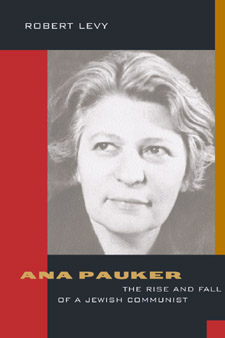 | Title: Ana Pauker: the rise and fall of a Jewish Communist Author: Levy, Robert 1957- Published: University of California Press, 2001 Subjects: History | Jewish Studies | Russian and Eastern European Studies | Politics | European History | Women's Studies Publisher's Description: In her own day, Ana Pauker was named "The Most Powerful Woman in the World" by Time magazine. Today, when she is remembered at all, she is thought of as the puppet of Soviet communism in Romania, blindly enforcing the most brutal and repressive Stalinist regime. Robert Levy's new biography changes the picture dramatically, revealing a woman of remarkable strength, dominated by conflict and contradiction far more than by dogmatism. Telling the story of Pauker's youth in an increasingly anti-Semitic environment, her commitment to a revolutionary career, and her rise in the Romanian Communist movement, Levy makes no attempt to whitewash Pauker's life and actions, but rather explores every contour of the complicated persona he found expressed in masses of newly accessible archival documents. [brief] Similar Items |
| 3. | 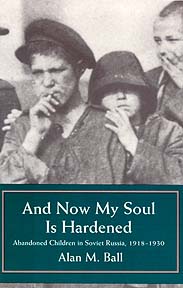 | Title: And now my soul is hardened: abandoned children in Soviet Russia, 1918-1930 Author: Ball, Alan M Published: University of California Press, 1994 Subjects: History | European History | Russian and Eastern European Studies Publisher's Description: Warfare, epidemics, and famine left millions of Soviet children homeless during the 1920s. Many became beggars, prostitutes, and thieves, and were denizens of both secluded underworld haunts and bustling train stations. Alan Ball's study of these abandoned children examines their lives and the strategies the government used to remove them from the streets lest they threaten plans to mold a new socialist generation. The "rehabilitation" of these youths and the results years later are an important lesson in Soviet history. [brief] Similar Items |
| 4. | 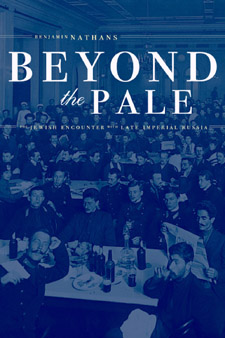 | Title: Beyond the pale: the Jewish encounter with late imperial Russia Author: Nathans, Benjamin Published: University of California Press, 2002 Subjects: History | Jewish Studies | Russian and Eastern European Studies Publisher's Description: A surprising number of Jews lived, literally and figuratively, "beyond the Pale" of Jewish Settlement in tsarist Russia during the half-century before the Revolution of 1917. Thanks to the availability of long-closed Russian archives, along with a wide range of other sources, Benjamin Nathans reinterprets the history of the Russian-Jewish encounter. In the wake of Russia's "Great Reforms," Nathans writes, a policy of selective integration stimulated social and geographic mobility among the empire's Jews. The reaction that culminated, toward the turn of the century, in ethnic restrictions on admission to universities, the professions, and other institutions of civil society reflected broad anxieties that Russians were being placed at a disadvantage in their own empire. Nathans's conclusions about the effects of selective integration and the Russian-Jewish encounter during this formative period will be of great interest to all students of modern Jewish and modern Russian history. [brief] Similar Items |
| 5. | 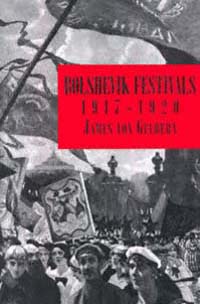 | Title: Bolshevik festivals, 1917-1920 Author: Von Geldern, James Published: University of California Press, 1993 Subjects: History | European History | European Literature | Russian and Eastern European Studies Publisher's Description: In the early years of the USSR, socialist festivals - events entailing enormous expense and the deployment of thousands of people - were inaugurated by the Bolsheviks. Avant-garde canvases decorated the streets, workers marched, and elaborate mass spectacles were staged. Why, with a civil war raging and an economy in ruins, did the regime sponsor such spectacles?In this first comprehensive investigation of the way festivals helped build a new political culture, James von Geldern examines the mass spectacles that captured the Bolsheviks' historical vision. Spectacle directors borrowed from a tradition that included tsarist pomp, avant-garde theater, and popular celebrations. They transformed the ideology of revolution into a mythologized sequence of events that provided new foundations for the Bolsheviks' claim to power. [brief] Similar Items |
| 6. | 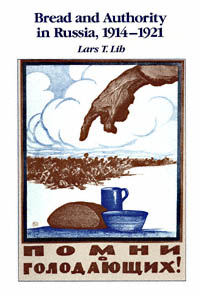 | Title: Bread and authority in Russia, 1914-1921 Author: Lih, Lars T Published: University of California Press, 1990 Subjects: History | European History | Politics | Russian and Eastern European Studies Publisher's Description: Between 1914 and 1921, Russia experienced a national crisis that destroyed the tsarist state and led to the establishment of the new Bolshevik order. During this period of war, revolution, and civil war, there was a food-supply crisis. Although Russia was one of the world's major grain exporters, the country was no longer capable of feeding its own people. The hunger of the urban workers increased the pace of revolutionary events in 1917 and 1918, and the food-supply policy during the civil war became the most detested symbol of the hardships imposed by the Bolsheviks.Focusing on this crisis, Lars Lih examines the fundamental process of political and social breakdown and reconstitution. He argues that this seven-year period is the key to understanding the Russian revolution and its aftermath. In 1921 the Bolsheviks rejected the food-supply policy established during the civil war; sixty-five years later, Mikhail Gorbachev made this change of policy a symbol of perestroika. Since then, more attention has been given both in the West and in the Soviet Union to the early years of the revolution as one source of the tragedies of Stalinist oppression.Lih's argument is based on a great variety of source material - archives, memoirs, novels, political rhetoric, pamphlets, and propoganda posters. His new study will be read with profit by all who are interested in the drama of the Russian revolution, the roots of both Stalinism and anti-Stalin reform, and more generally in a new way of understanding the effects of social and political breakdown. [brief] Similar Items |
| 7. | 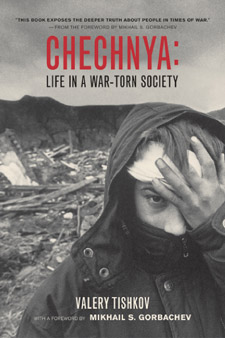 | Title: Chechnya: life in a war-torn society Author: Tishkov, Valeriĭ Aleksandrovich Published: University of California Press, 2004 Subjects: Anthropology | Ethnic Studies | European History | Sociology | Russian and Eastern European Studies Publisher's Description: This book illuminates one of the world's most troubled regions from a unique perspective - that of a prominent Russian intellectual. Valery Tishkov, a leading ethnographer who has also served in several important political posts, examines the evolution of the war in Chechnya that erupted in 1994, untangling the myths, the long-held resentments, and the ideological manipulations that have fueled the crisis. In particular, he explores the key themes of nationalism and violence that feed the turmoil there. Forceful, original, and timely, his study combines extensive interview material, historical perspectives, and deep local knowledge. Tishkov sheds light on Chechnya in particular and on how secessionist conflicts can escalate into violent conflagrations in general. With its balanced assessments of both Russian and Chechen perspectives, this book will be essential reading for people seeking to understand the role of Islamic fundamentalist nationalism in the contemporary world. [brief] Similar Items |
| 8. | 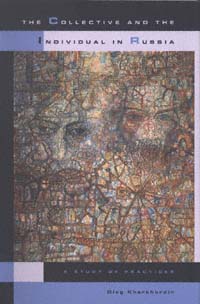 | Title: The collective and the individual in Russia: a study of practices Author: Kharkhordin, Oleg 1964- Published: University of California Press, 1999 Subjects: History | Social Theory | European History | Russian and Eastern European Studies | Intellectual History Publisher's Description: Oleg Kharkhordin has constructed a compelling, subtle, and complex genealogy of the Soviet individual that is as much about Michel Foucault as it is about Russia. Examining the period from the Russian Revolution to the fall of Gorbachev, Kharkhordin demonstrates that Party rituals - which forced each Communist to reflect intensely and repeatedly on his or her "self," an entirely novel experience for many of them - had their antecedents in the Orthodox Christian practices of doing penance in the public gaze. Individualization in Soviet Russia occurred through the intensification of these public penitential practices rather than the private confessional practices that are characteristic of Western Christianity. He also finds that objectification of the individual in Russia relied on practices of mutual surveillance among peers, rather than on the hierarchical surveillance of subordinates by superiors that characterized the West. The implications of this book expand well beyond its brilliant analysis of the connection between Bolshevism and Eastern Orthodoxy to shed light on many questions about the nature of Russian society and culture. [brief] Similar Items |
| 9. | 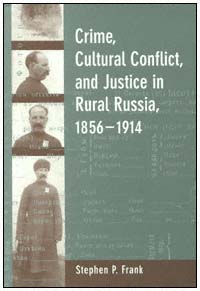 | Title: Crime, cultural conflict, and justice in rural Russia, 1856-1914 Author: Frank, Stephen 1955- Published: University of California Press, 1999 Subjects: History | Russian and Eastern European Studies | Cultural Anthropology | Social Problems | European History | Law | Criminology Publisher's Description: This book is the first to explore the largely unknown world of rural crime and justice in post-emancipation Imperial Russia. Drawing upon previously untapped provincial archives and a wealth of other neglected primary material, Stephen P. Frank offers a major reassessment of the interactions between peasantry and the state in the decades leading up to World War I. Viewing crime and punishment as contested metaphors about social order, his revisionist study documents the varied understandings of criminality and justice that underlay deep conflicts in Russian society, and it contrasts official and elite representations of rural criminality - and of peasants - with the realities of everyday crime at the village level. [brief] Similar Items |
| 10. | 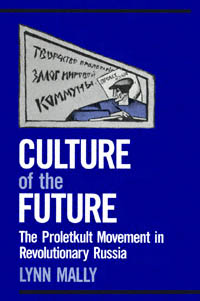 | Title: Culture of the future: the Proletkult movement in revolutionary Russia Author: Mally, Lynn Published: University of California Press, 1990 Subjects: Russian and Eastern European Studies | European History | Russian and Eastern European Studies Publisher's Description: Just days before the October 1917 Revolution, the Proletkult was formed in Petrograd to serve as an umbrella organization for numerous burgeoning working-class cultural groups. Advocates of the Proletkult hoped to devise new forms of art, education, and social relations that would express the spirit of the class that had come to power in the world's first successful proletarian revolution. Lynn Mally offers a detailed analysis of the Proletkult's cultural and political agenda. Drawing extensively on archival sources, she argues that the creation of a new culture proved as difficult and controversial as the creation of new notions of politics. From the outset, the Proletkult was divided by severe political and social tensions as members struggled to define the role of the organization and the cultural desires of the proletariat. What fused this divided movement was the shared belief that without radical cultural change the revolution would not succeed. The Proletkult's eventual decline graphically shows how political consolidation, institutional rivalries, and the devastating social consequences of the revolution and Civil War all worked together to limit the utopian potential of the October Revolution. [brief] Similar Items |
| 11. | 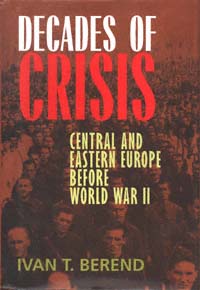 | Title: Decades of crisis: Central and Eastern Europe before World War II Author: Berend, T. Iván (Tibor Iván) 1930- Published: University of California Press, 1998 Subjects: History | European History | European Studies | Russian and Eastern European Studies | Economics and Business Publisher's Description: Only by understanding Central and Eastern Europe's turbulent history during the first half of the twentieth century can we hope to make sense of the conflicts and crises that have followed World War II and, after that, the collapse of Soviet-controlled state socialism. Ivan Berend looks closely at the fateful decades preceding World War II and at twelve countries whose absence from the roster of major players was enough in itself, he says, to precipitate much of the turmoil.As waves of modernization swept over Europe, the less developed countries on the periphery tried with little or no success to imitate Western capitalism and liberalism. Instead they remained, as Berend shows, rural, agrarian societies notable for the tenacious survival of feudal and aristocratic institutions. In that context of frustration and disappointment, rebellion was inevitable. Berend leads the reader skillfully through the maze of social, cultural, economic, and political changes in Hungary, Czechoslovakia, Yugoslavia, Poland, Romania, Bulgaria, Albania, Austria, Latvia, Lithuania, Estonia, and the Soviet Union, showing how every path ended in dictatorship and despotism by the start of World War II. [brief] Similar Items |
| 12. | 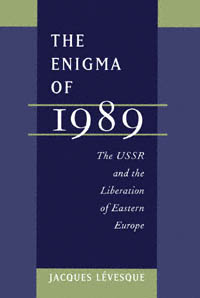 | Title: The enigma of 1989: the USSR and the liberation of Eastern Europe Author: Lévesque, Jacques Published: University of California Press, 1997 Subjects: Politics | History | European History | Russian and Eastern European Studies Publisher's Description: The Soviet external empire fell in 1989 virtually without bloodshed. The domino-like collapse of the communist regimes of Eastern Europe was not anticipated by political experts in either the East or the West. Most surprising of all was the Soviet Union's permissive reactions to the secession. For the first time in modern history, such an epochal upheaval could take place not only without war but also without major international tensions.This book is the first comprehensive scholarly attempt to elucidate Soviet behavior toward Eastern Europe in 1989. Jacques Lévesque thoroughly analyses the policies of the USSR toward Eastern Europe during the Gorbachev era and clarifies the goals that underpinned these policies.Based on interviews with political leaders and exhaustive research in Russia, Czechoslovakia, Hungary, Poland, and the other ex-Warsaw Pact countries, this book traces the nuances of each country's case as a set of continually changing, mutually reinforcing causes and effects. [brief] Similar Items |
| 13. | 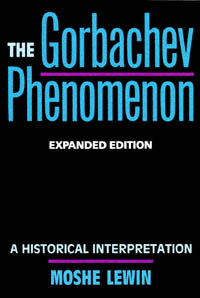 | Title: The Gorbachev phenomenon: a historical interpretation Author: Lewin, Moshe 1921- Published: University of California Press, 1991 Subjects: History | European History | Sociology | Politics | Russian and Eastern European Studies Publisher's Description: The "Gorbachev phenomenon" is seen as the product of complex developments during the last seventy years - developments that changed the Soviet Union from a primarily agrarian society into an urban, industrial one. Here, for the first time, a noted authority on Soviet society identifies the crucial h . . . [more] Similar Items |
| 14. | 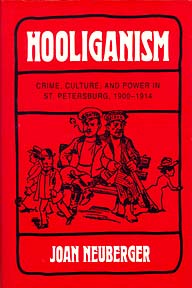 | Title: Hooliganism: crime, culture, and power in St. Petersburg, 1900-1914 Author: Neuberger, Joan Published: University of California Press, 1993 Subjects: History | Politics | Russian and Eastern European Studies | Criminology Publisher's Description: n this pioneering analysis of diffuse underclass anger that simmers in many societies, Joan Neuberger takes us to the streets of St. Petersburg in 1900-1914 to show us how the phenomenon labeled hooliganism came to symbolize all that was wrong with the modern city: increasing hostility between class . . . [more] Similar Items |
| 15. | 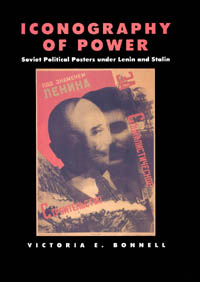 | Title: Iconography of power: Soviet political posters under Lenin and Stalin Author: Bonnell, Victoria E Published: University of California Press, 1998 Subjects: Sociology | Popular Culture | European Studies | Russian and Eastern European Studies | Politics | Art Criticism | History | European History Publisher's Description: Masters at visual propaganda, the Bolsheviks produced thousands of vivid and compelling posters after they seized power in October 1917. Intended for a semi-literate population that was accustomed to the rich visual legacy of the Russian autocracy and the Orthodox Church, political posters came to occupy a central place in the regime's effort to imprint itself on the hearts and minds of the people and to remold them into the new Soviet women and men. In this first sociological study of Soviet political posters, Victoria Bonnell analyzes the shifts that took place in the images, messages, styles, and functions of political art from 1917 to 1953. Everyone who lived in Russia after the October revolution had some familiarity with stock images of the male worker, the great communist leaders, the collective farm woman, the capitalist, and others. These were the new icons' standardized images that depicted Bolshevik heroes and their adversaries in accordance with a fixed pattern. Like other "invented traditions" of the modern age, iconographic images in propaganda art were relentlessly repeated, bringing together Bolshevik ideology and traditional mythologies of pre-Revolutionary Russia. Symbols and emblems featured in Soviet posters of the Civil War and the 1920s gave visual meaning to the Bolshevik worldview dominated by the concept of class. Beginning in the 1930s, visual propaganda became more prescriptive, providing models for the appearance, demeanor, and conduct of the new social types, both positive and negative. Political art also conveyed important messages about the sacred center of the regime which evolved during the 1930s from the celebration of the heroic proletariat to the deification of Stalin. Treating propaganda images as part of a particular visual language, Bonnell shows how people "read" them - relying on their habits of seeing and interpreting folk, religious, commercial, and political art (both before and after 1917) as well as the fine art traditions of Russia and the West. Drawing on monumental sculpture and holiday displays as well as posters, the study traces the way Soviet propaganda art shaped the mentality of the Russian people (the legacy is present even today) and was itself shaped by popular attitudes and assumptions. Iconography of Power includes posters dating from the final decades of the old regime to the death of Stalin, located by the author in Russian, American, and English libraries and archives. One hundred exceptionally striking posters are reproduced in the book, many of them never before published. Bonnell places these posters in a historical context and provides a provocative account of the evolution of the visual discourse on power in Soviet Russia. [brief] Similar Items |
| 16. | 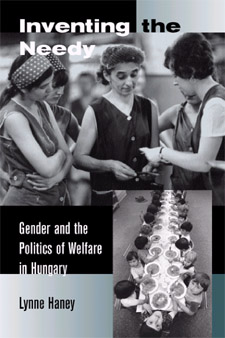 | Title: Inventing the needy: gender and the politics of welfare in Hungary Author: Haney, Lynne A. (Lynne Allison) 1967- Published: University of California Press, 2002 Subjects: Sociology | European Studies | European History | Gender Studies | Law | Social Problems | Political Theory | Russian and Eastern European Studies | Sociology | Sociology Publisher's Description: Inventing the Needy offers a powerful, innovative analysis of welfare policies and practices in Hungary from 1948 to the last decade of the twentieth century. Using a compelling mix of archival, interview, and ethnographic data, Lynne Haney shows that three distinct welfare regimes succeeded one another during that period and that they were based on divergent conceptions of need. The welfare society of 1948-1968 targeted social institutions, the maternalist welfare state of 1968-1985 targeted social groups, and the liberal welfare state of 1985-1996 targeted impoverished individuals. Because they reflected contrasting conceptions of gender and of state-recognized identities, these three regimes resulted in dramatically different lived experiences of welfare. Haney's approach bridges the gaps in scholarship that frequently separate past and present, ideology and reality, and state policies and local practices. A wealth of case histories gleaned from the archives of welfare institutions brings to life the interactions between caseworkers and clients and the ways they changed over time. In one of her most provocative findings, Haney argues that female clients' ability to use the state to protect themselves in everyday life diminished over the fifty-year period. As the welfare system moved away from linking entitlement to clients' social contributions and toward their material deprivation, the welfare system, and those associated with it, became increasingly stigmatized and pathologized. With its focus on shifting inventions of the needy, this broad historical ethnography brings new insights to the study of welfare state theory and politics. [brief] Similar Items |
| 17. | 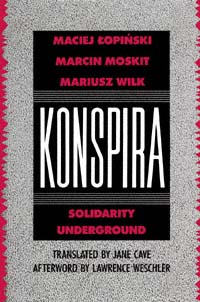 | Title: Konspira: Solidarity underground Author: Łopiński, Maciej Published: University of California Press, 1990 Subjects: Russian and Eastern European Studies | European History Publisher's Description: Konspira bares the soul and mind of Solidarity not long before the movement's stunning emergence as Poland's political vanguard. Written while martial law still gripped the country, Konspira tells the inside story of this inspiring contemporary workers' movement. The authors taped, then consolidated, over a hundred hours of secret interviews. Their subjects were eight of the most prominent Solidarity union leaders, gone into hiding as the result of a nationwide police-military crackdown by the Polish government.Solidarity activists were either locked up in internment camps or forced underground, where they coordinated a clandestine network to sustain their organization. This compelling account of a crucial episode in the history of the Solidarity movement is both intimate and representative of the growing opposition to entrenched Communist regimes in East-Central Europe. This volume has benefited from the collegial support of The Wake Forest University Studium. [brief] Similar Items |
| 18. | 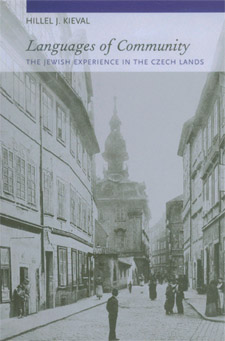 | Title: Languages of community: the Jewish experience in the Czech lands Author: Kieval, Hillel J Published: University of California Press, 2000 Subjects: Jewish Studies | European Studies | European History | Russian and Eastern European Studies | Judaism Publisher's Description: With a keen eye for revealing details, Hillel J. Kieval examines the contours and distinctive features of Jewish experience in the lands of Bohemia and Moravia (the present-day Czech Republic), from the late eighteenth to the late twentieth century. In the Czech lands, Kieval writes, Jews have felt the need constantly to define and articulate the nature of group identity, cultural loyalty, memory, and social cohesiveness, and the period of "modernizing" absolutism, which began in 1780, brought changes of enormous significance. From that time forward, new relationships with Gentile society and with the culture of the state blurred the traditional outlines of community and individual identity. Kieval navigates skillfully among histories and myths as well as demography, biography, culture, and politics, illuminating the maze of allegiances and alliances that have molded the Jewish experience during these 200 years. [brief] Similar Items |
| 19. | 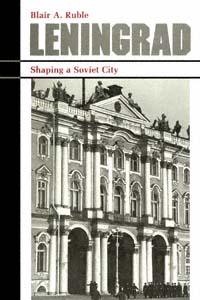 | Title: Leningrad: shaping a Soviet city Author: Ruble, Blair A 1949- Published: University of California Press, 1990 Subjects: Russian and Eastern European Studies | European History Publisher's Description: Throughout much of this century, cities around the world have sought to gain control over their urban destinies through concerted government action. Nowhere has this process of state intervention gone further than in the Soviet Union. This volume explores the ways in which local and regional political, economic, and cultural leaders in Leningrad determine the physical and socioeconomic contours of their city and region within such a centralized economic and political environment.The author examines four major policy initiatives that have emerged in Leningrad since the 1950s - physical planning innovations, integrated scientific-production associations, vocational education reform, and socioeconomic planning - and that have been anchored in attempts to plan and manage metropolitan Leningrad. Each initiative illuminates the bureaucratic and political strategies employed to obtain economic objectives, as well as the bureaucratic patterns which distinguish market and non-market experiences. The boundaries for autonomous action by local Soviet politicians, planners, and managers emerge through this inquiry. [brief] Similar Items |
| 20. | 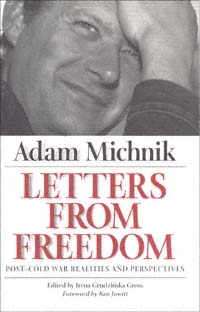 | Title: Letters from freedom: post-cold war realities and perspectives Author: Michnik, Adam Published: University of California Press, 1998 Subjects: History | Politics | Russian and Eastern European Studies | Social and Political Thought | European History | Intellectual History Publisher's Description: A hero to many, Polish writer Adam Michnik ranks among today's most fearless and persuasive public figures. His imprisonment by Poland's military regime in the 1980s did nothing to quench his outpouring of writings, many of which were published in English as Letters from Prison . Beginning where that volume ended, Letters from Freedom finds Michnik briefly in prison at the height of the "cold civil war" between authorities and citizens in Poland, then released. Through his continuing essays, articles, and interviews, the reader can follow all the momentous changes of the last decade in Poland and East-Central Europe. Some of the writings have appeared in English in various publications; most are translated here for the first time.Michnik is never detached. His belief that people can get what they want without hatred and violence has always translated into action, and his actions, particularly the activity of writing, have required his contemporaries to think seriously about what it is they want. His commitment to freedom is absolute, but neither wild-eyed nor humorless; with a characteristic combination of idealism and pragmatism, Michnik says, "In the end, politics is the art of foreseeing and implementing the possible."Michnik's blend of conviction and political acumen is perhaps most vividly revealed in the interviews transcribed in the book, whether he is the subject of the interview or is conducting a conversation with Czeslaw Milosz, Vacláv Havel, or Wojciech Jaruzelski. These face-to-face exchanges tell more about the forces at work in contemporary Eastern Europe than could any textbook. Sharing Michnik's intellectual journey through a tumultuous era, we touch on all the subjects important to him in this wide-ranging collection and find they have importance for everyone who values conscience and responsibility. In the words of Jonathan Schell, "Michnik is one of those who bring honor to the last two decades of the twentieth century." [brief] Similar Items |